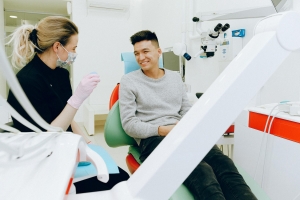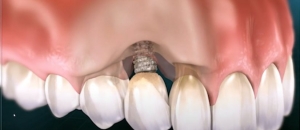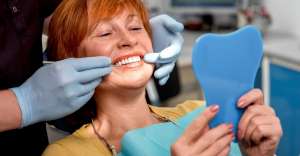Adjusting to new dentures can be quite challenging for patients. To quickly adapt to this new lifestyle, eat without discomfort, and feel as if you are using natural teeth, it's important to select foods that won't cause unpleasant sensations during each meal. Therefore, the specialists at www.vipdentalny.com provide qualified assistance when fitting dentures and offer guidance on how to care for them properly, which foods to choose, and how to make this experience as smooth as possible.
Basic Principles of Nutrition When Wearing Dentures
Immediately after fitting the dentures, the gums and mucous membranes of the mouth may be injured, and it takes some time for everything to normalize. Therefore, during the initial adaptation to dentures, you should be careful by choosing soft foods that don't require chewing and creating pressure on the dentures. These can include cream soups, fruit and vegetable purees, and fruits with soft pulp (bananas, peaches, etc.). During this period, your diet may resemble baby food because it should be soft and balanced to ensure the body receives enough nutrients and microelements.
Gradually introduce solid foods into your diet, allowing your gums to get used to them. To make chewing easier, even with less solid foods, try cutting them into smaller pieces. While chewing, you might be tempted to chew only on the side that hurts less. For a while, this can be justified, but if possible, try to chew on both sides to avoid putting too much strain on the gums on one side, especially if you have dentures on both the right and left sides. Also, if possible, avoid sticky foods, such as dried fruits, chewy candies, etc.
Recommendations for Choosing Foods
To keep your diet full of beneficial minerals and substances while being gentle on your dentures and sensitive gums, choose the following foods:
- Fruits and vegetables that are easy to chew or can be stewed to become soft. For example, you can prepare purees and stews and eat bananas, melons, berries, etc.
- Ensure your diet includes proteins such as fish, eggs, and soft lean meats (turkey, veal, chicken). You can also enrich your diet with yogurts, cheeses, and other dairy products. Besides being well absorbed and easy to consume, they also help strengthen your gums.
- Feel free to add grains to your diet: cereals, oatmeal, and whole-grain bread. Cereals are an excellent source of energy as they are rich in fiber and slow carbohydrates, which are essential for normal digestion.
- Don't forget to drink plenty of water and fresh juices. You can also drink tea, but it is advisable to have it warm rather than hot or cold.
Techniques and Tips for Comfortable Eating
While getting used to dentures and adjusting to them, try to eat carefully:
- Bite food into small pieces or cut it into slices.
- Chew thoroughly and slowly. Turn eating into a calm, almost meditative process.
- After meals, rinse your mouth with water to wash away food residues. You can even brush your teeth more often using a soft-bristled toothbrush that doesn't damage the gums. Dental floss will also help prevent the accumulation of food residues between your teeth. Using dental floss has become much more convenient, with packaging and usability improvements.
Use these tips regularly, even if you are using alternatives to dentures, implants, or going through a period after filling or restoration of one or more teeth.
Caring for Dentures After Eating
In addition to using a soft-bristled toothbrush and dental floss, it's advisable to follow other tips for denture care to ensure a smooth and trouble-free experience.
Clean your teeth with gentle means: a soft toothbrush or toothpaste selected by your dentist (even a good and high-quality toothpaste may not be suitable for you). Avoid abrasive products like tooth powder, as they can scratch the dentures and natural tooth enamel, increasing the risk of cavities.
If you don't wear your dentures all the time and remove them (for example, at night), store them in water or a special solution. The solution or water will prevent the denture surface from drying out, ensuring they last longer and don't deform in the process. If you notice discomfort while using the dentures or if the denture shows signs of wear, microcracks, or chips, this is a reason to immediately contact a dental technician to resolve the issue.
Even if everything is fine with your teeth and gums, a visit to the dentist every six months will prevent many problems as they will be identified and resolved easily and quickly in the early stages. Therefore, don't be afraid to visit the dentist for preventive purposes; it's cheaper than undergoing expensive and complex treatment for chronic oral and dental diseases later.
Bottom Line
Having dentures allows you to enjoy life and radiate confidence. A properly selected diet will help you achieve this. In most cases, it's difficult to get used to dentures during the first week, but then, you may find the comfortable and nutritious diet enjoyable. So, the restrictions mentioned above are quite conditional and not significant compared to the benefits you gain from wearing dentures and having a healthy smile.






